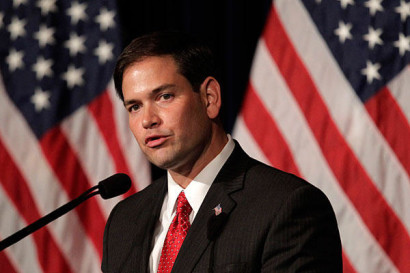A Strong Finish – and Great Start – for Marco Rubio
Florida Senator Marco Rubio surpassed expectations Monday night with a third place finish just one point behind bombastic billionaire Donald Trump and only five points behind Senator Ted Cruz, the conservative favorite among Evangelical voters who traditionally dominate the caucus in the Hawkeye State.
It was a strong finish, with many late deciders breaking for Rubio.
It’s now a three-man race for the Republican nomination.
Although Rubio’s third place finish was expected, his 24 percent of the vote – just behind Trump’s 25 percent – means the turnout for Rubio exceeded expectations considerably. That is significant for numerous reasons.
Rubio’s ability to capture a wide swath of Iowa voters, including Evangelicals, suggests he could possibly get the Republican nomination. Whether he does will depend on the level of pragmatism among Conservative primary and caucus voters in other states.
For Republican primary voters who want to nominate someone who has a chance to beat Hillary Clinton (who will almost certainly get the Democratic nomination,) the real underlying question is: should Republicans cleave to their conservative principles in the absolute, and plan to mobilize every last conservative in this country to turn out to vote in November?
If so, the best choice would be Ted Cruz.
Or, would Republicans be wiser to choose a nominee who could appeal to a broader base of the electorate, drawing independent voters and conservative Democrats (wherever such may still be found) into the party, including some among many new Latin-speaking immigrants in the U.S., for purposes of voting in November, and beyond?
If so, the best choice would be Marco Rubio.
Or, should Conservatives just go with a wild card on the chance that the electorate in our media age would vote at least partly on the desire to be entertained?
If so, the choice would be Donald Trump
(Republicans would be taking a big fat risk here. If elected, would an eccentric billionaire whose anger management and ego issues belie his considerable entertainment value and business acumen operate entirely rationally, much less from a conservative political philosophy? It’s by no means a certainty).
Personal opinion aside, I think Trump, Rubio, and Kasich are the only Republicans who would have a chance in a general election.
If the Republicans want to survive as a viable party, they will have to shift, even if only slightly, in terms of certain issues, what it means to be a Republican. More on this later.
Fred Barnes of The Weekly Standard speculated today that Trump would have a good shot at winning the general election because he, like Ronald Reagan, may have the ability to pull voters who are not Republicans already. I think Barnes is on to something, and that Conservatives are wrong when they cite Reagan’s election as evidence of the need to nominate an extremely staunch conservative like Ted Cruz.
The reason is simple: to win, pretty much every Conservative in this country will need to turn out to vote. But given demographics, there are simply not enough of those people to outnumber Democrats and Independents. Republicans need to nominate someone who will also, even as they mobilize the conservative base, bring more people –including Independents – into a bigger tent. I think Rubio, with his solid yet flexible brand of conservatism, could do this. Also, his conservatism more closely parallels Reagan’s.
Cruz is more of a Barry Goldwater figure, and while it may be true that “extremism in the defense of liberty is no vice,” Goldwater still lost.
Purist conservatism is even less relevant to most voters today than it was in 1964. Many conservatives I know are brilliant people, but I think the conservatism in their natures – while it makes them among the most loyal and hardworking people I know – predisposes them to be a little, well, inflexible. For that reason they frequently do things such as sit out the election when the nominee is not a staunch Republican and refuse to perceive that most Americans do not perceive their interests to be aligned with Conservatism that is hard line, but that does not mean there aren’t elements of conservative political philosophy – like self-reliance – that resonate with millions of people, including new immigrants to the U.S., who can be brought into the Republican Party with a nominee like Rubio.
In other words, their very Conservative nature is leading some Conservative Republicans to greatly overestimate the odds that someone like Ted Cruz could win a general election. He can’t. If they are truly smart, as it seems many Iowa caucus voters were, they will see that Rubio is the more pragmatic choice.
That doesn’t mean Conservatives should give up their core principles. But someone who wants to govern an enormous, ideologically diverse (and diversifying as we speak) nation needs to be a realist about problem solving. He also needs some flexibility in his character, nature, and record.
That’s Rubio.
This entry was written by Heather Robinson and posted on February 3, 2016 at 1:07 am and filed under Blog. permalink. Follow any comments here with the RSS feed for this post. Keywords: Iowa caucus 2016, Marco Rubio, Ted Cruz. Post a comment or leave a trackback: Trackback URL. */?>




